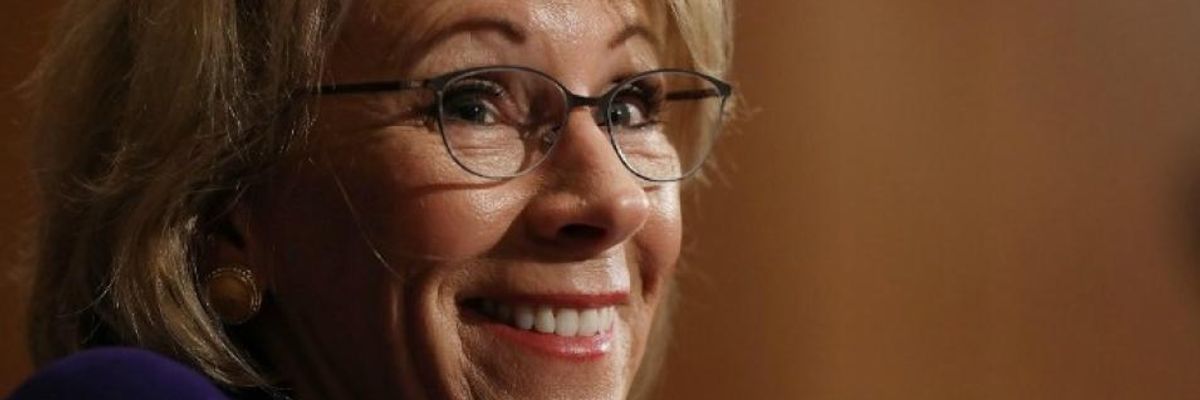In the much-written-about 60 Minutes interview of U.S. Secretary of Education Betsy DeVos by CBS reporter Lesley Stahl there was a telling exchange when Stahl queried DeVos on whether she had visited any "bad schools." DeVos replied, "I have not intentionally visited schools that are underperforming." But DeVos has visited an underperforming school--only she called it a "a shining example."
The school, which will be closed at the end of the school year due to poor academic performance, was the Excel Academy Public Charter School, an all-girls charter in Washington, D.C. First Lady Melania Trump and Queen Rania Al-Abdullah of Jordan accompanied DeVos on the visit in 2016. Trump called the charter school "an exceptional example."
The school was in trouble with the District's charter school oversight board when DeVos and company visited. Less than nine months later, the board voted unanimously to close the school, with the board chair saying, "The trend for student performance over the past several years has been negative, despite any benefits that may have occurred."
D.C. is chock full of charter schools, and DeVos, a big advocate for charters, could have cherry picked a better performing one. Obviously, she didn't know about the school's academic performance then, and doesn't know about it now. I would also contend she doesn't care.
Excel Academy impressed DeVos not because of what it does but because of what it is (or was). When DeVos says "options," what she really means is "alternatives" to public schools which she has ridiculed as a "dead end."
Many critics of DeVos understand her animosity toward public education, and accordingly challenge her grasp of facts, question her leadership abilities, lampoon her gaffes, and take issue with her education agenda.
The problem is, DeVos does not have an education agenda. She has a political agenda.
DeVos praised Florida in the 60 Minutes interview, saying the state has "a lot of choice" and "traditional public schools ... get better, as well." But while it's true Florida has lots of charter schools and numerous voucher programs that let parents get taxpayer money to send their children to private schools, public schools have not gotten significantly better because of this competition.
Florida's performance on the National Assessment of Education Progress--a longtime respected periodic assessment of schools--is mixed. On the most recent NAEP, Florida fourth graders were somewhat above national average in reading and math, and 8th graders were about average in reading and somewhat below average in math. States with lots of charter schools and voucher programs, like Louisiana and Nevada, score at the bottom on NAEP, while top performers, such as Massachusetts and Vermont, are much more restrictive of education options other than public schools.
"A 2009 study from the Rand Corp. found little evidence that the presence of charter schools affects the achievement scores of students in nearby traditional public schools either positively or negatively," writes Philip Bump for The Washington Post. "A number of studies since have found similarly murky results."
But the reality is Betsy DeVos doesn't much care about what any studies "show" about the results of charters and vouchers.
For her, and other school choice advocates, what they call "parent choice" matters more than any measures of performance. (There's the current inconvenience of having to justify funding of the school choice enterprise with taxpayer money. But they'll figure out a way around that.)
When DeVos said to Stahl, "It all comes down to individual kids," what she really means is that there is no place in her worldview for the communal enterprise we know as public education. The sooner her critics get this, the better able they'll be to convey the real danger she represents to the nation.

